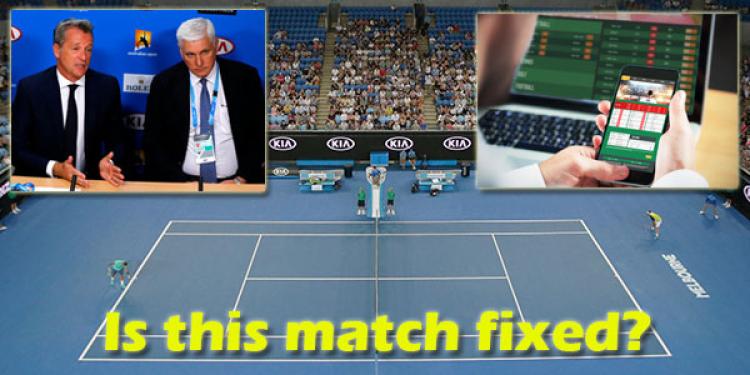Corruption In Sport & Parliament But Tennis Bets On An IRP
Posted: March 2, 2016
Updated: May 25, 2017

TIU Before CMSSC
• MPs grill tennis authorities
• Willerton under funded
• Efforts “a fig leaf”
Great Britain begins defending its Davis Cup title against Japan with Andy Murray in the forefront and under the microscope, but it’s Tennis that finds itself in the spotlight once again as the snowballing scandal of corruption in sport brings the head of the Tennis Integrity Unit to Parliament, and the encounter was less than reassuring.
The Culture Media & Sport Select Committee can be a bit brutal. Members of Parliament loathe the idea that anyone might be giving the public a very expensive and distinctly less-than-perfect service, perhaps feeling it is in some way muscling in on their territory. What’s the difference between tennis and politics? One involves a lot of grunting and pointlessly batting things back and forth repetitively in various locations around the world at a huge cost, and the other one is Tennis.
MP’s expenses might be a tad more convoluted than 175 quid for Centre Court tickets at Wimbledon but there was definitely a tinge of hypocrisy to politicians questioning the Tennis Integrity Unit about corruption in sport, given most of us would prefer they question themselves about corruption in politics, however deflection is the best defense so the recent media revelations about tennis match fixing scandals and unusual betting activity was a bandwagon of outrage they couldn’t resist.
If Nigel Willerton shared that understanding of Realpolitik he was wise enough to keep it to himself as the politicians rubbished the TIU’s efforts to combat the betting and match fixing scandals in Tennis, and, gambling news headlines are a great distraction, made sure to highlight everything the press had already told us. Like that in 2012 there were just 14 reports of suspicious matches from betting companies, that went to 46 the following, rose to 91 in 2014 and last year? Well it jumped to 246.
Blame It On The Budget And Betting Companies
Mr. Willerton acknowledged these facts and pointed out that corruption in sport, particularly his sport had got worse since the betting companies had introduced futures markets, especially those pertaining to lower level matches. This was Mr. Willerton being as deflective as the politicians, making sure he said “All the betting operators have different ideas of what constitutes an alert.” Which is vaguely true, but seems to infer that those who like to bet on sports in the UK have betting companies to blame.
This is something Bet365, Betfair and Pinnacle et al will be a little displeased to hear, after all they’re the ones being ripped off in tennis match fixing scams, and might note, as MPs did, that whilst the International Tennis Federation signed a seventy-million dollar deal with Sportradar it only gave two hundred grand of that to fund the TIU, and the entire TIU consists of a $2 million budget, just six full time staff, none of whom are an expert on sports betting. Classic.
Bet those gambling cartels are quaking in their boots, right?

Of course since BuzzFeed and the BBC alleged 16 players in the top fifty had been pegged as possibly involved in fixed matches, and that officials had been banned without the authorities mentioning it to anyone else, an Independent Review Panel has been set up to look into whether the TIU is armed to combat this rising time of corruption in sport that has so badly tainted tennis. Taking up to a year to report on the blatantly obvious smacks of foot-dragging, and politicians recognize that from the mirror.
Corruption In Sport Fought On A Shoe String?
Not that Chris Kermode, chairman of the Association of Tennis Professionals, was going to portray it as anything like that, telling MPs, “We have demonstrated very openly that we are not being complacent and I believe there is no wrongdoing.” Which is precisely the image the world of Tennis would like to present to the millions of fans. Naturally that’s not a perception adjustment made easier by Willerton having to state “We have never had an alert at Wimbledon”, but admitting in 2015 there were three alerts about Grand Slam matches in 2015.
Jesse Norman, chair of the select committee, was particularly unimpressed with the punting of this issue into the long grass the IRP represents, asking of the bare-bones budget of the TIU “Isn’t that an amazing disparity and doesn’t it show a big question mark about how seriously tennis takes this?” Damian Collins MP was no less scathing calling it “a fig leaf” and said there was a “slightly blase attitude” towards the scale of corruption in sport.
The Tennis authorities carefully practiced “honest guv” routine is fooling no one, and the arrogance it requires to think that whilst other sports are having their dirty laundry aired in public, tennis can sweep it all under the rug is breathtaking. Those that take advantage of UK gambling laws to bet on the tennis need to be sure that the games on which they wager are not subject to the whims of a betting cartel in South East Asia, and the sport needs to stop pretending there is no corruption in sport, and particularly their sport, because we all know there is, and didn’t need politicians pointing it out to us either.











